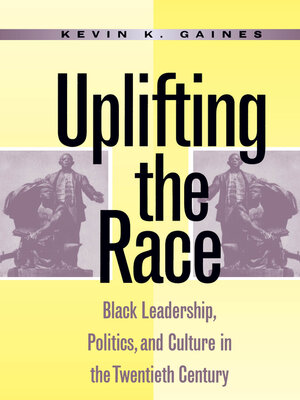Uplifting the Race
ebook ∣ Black Leadership, Politics, and Culture in the Twentieth Century
By Kevin K. Gaines

Sign up to save your library
With an OverDrive account, you can save your favorite libraries for at-a-glance information about availability. Find out more about OverDrive accounts.
Find this title in Libby, the library reading app by OverDrive.



Search for a digital library with this title
Title found at these libraries:
| Library Name | Distance |
|---|---|
| Loading... |
Amidst the violent racism prevalent at the turn of the twentieth century, African American cultural elites, struggling to articulate a positive black identity, developed a middle-class ideology of racial uplift. Insisting that they were truly representative of the race’s potential, black elites espoused an ethos of self-help and service to the black masses and distinguished themselves from the black majority as agents of civilization; hence the phrase 'uplifting the race.'
A central assumption of racial uplift ideology was that African Americans' material and moral progress would diminish white racism. But Kevin Gaines argues that, in its emphasis on class distinctions and patriarchal authority, racial uplift ideology was tied to pejorative notions of racial pathology and thus was limited as a force against white prejudice.
Drawing on the work of W. E. B. Du Bois, Anna Julia Cooper, Alice Dunbar-Nelson, Hubert H. Harrison, and others, Gaines focuses on the intersections between race and gender in both racial uplift ideology and black nationalist thought, showing that the meaning of uplift was intensely contested even among those who shared its aims. Ultimately, elite conceptions of the ideology retreated from more democratic visions of uplift as social advancement, leaving a legacy that narrows our conceptions of rights, citizenship, and social justice.
A central assumption of racial uplift ideology was that African Americans' material and moral progress would diminish white racism. But Kevin Gaines argues that, in its emphasis on class distinctions and patriarchal authority, racial uplift ideology was tied to pejorative notions of racial pathology and thus was limited as a force against white prejudice.
Drawing on the work of W. E. B. Du Bois, Anna Julia Cooper, Alice Dunbar-Nelson, Hubert H. Harrison, and others, Gaines focuses on the intersections between race and gender in both racial uplift ideology and black nationalist thought, showing that the meaning of uplift was intensely contested even among those who shared its aims. Ultimately, elite conceptions of the ideology retreated from more democratic visions of uplift as social advancement, leaving a legacy that narrows our conceptions of rights, citizenship, and social justice.







